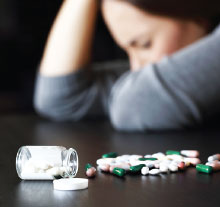Journal Digest: Sertraline & Depression; Cognitive Therapy & Pregnancy; Clozaphine & Schizofrenia; Despair & Negative outcome; LGBTQ Teens & Bullying; Exposure Therapy & Drug Craving
Sertraline Found to Reduce Irritability in Depressed Patients

Nearly half of patients with depression report significant irritability, yet few studies have looked at how best to treat this symptom. A study published in the Journal of Affective Disorders suggests that sertraline may reduce irritability in patients with major depressive disorder.
Researchers at the University of Texas Southwestern Medical Center conducted a secondary analysis of data from the Establishing Moderators and Biosignatures of Antidepressant Response in Clinical Care (EMBARC) study. EMBARC was an eight-week clinical trial comparing the effects of sertraline with placebo in over 300 adults with depression. The participants were asked to assess their symptoms of irritability using the five-item irritability domain of the Concise Associated Symptom Tracking scale (CAST-IRR) at the start of the study and every two weeks after for the duration of the trial.
For this analysis, the researchers analyzed data from 292 participants who completed the CAST-IRR at baseline. They found that at weeks 4, 6, and 8, the participants taking sertraline had significantly greater reductions in irritability compared with those taking placebo. By week 8, CAST-IRR scores dropped by 4.4 points in the sertraline group compared with 1.8 points in the placebo group. The reduction in irritability with sertraline was significant even after controlling for improvements in overall depression.
The researchers acknowledged that because EMBARC tested only one antidepressant, they do not know whether irritability improvement is specific to sertraline or might extend to other selective serotonin reuptake inhibitors or even other classes of antidepressants.
Jha MK, Minhajuddin A, Chin Fatt C, Trivedi MH. Improvements in Irritability With Sertraline Versus Placebo: Findings From the EMBARC Study. J Affect Disord. 2020; 275:44-47.
Cognitive Therapy May Be Option for Pregnant Women Instead of Antidepressants

Pregnant women in remission from depression who gradually taper antidepressants while receiving cognitive therapy do not appear to be at higher risk of relapse than women who continue their medication, suggests a small study in the Journal of Clinical Psychiatry.
“Although our findings need to be replicated in a larger trial, our study … should encourage further research on alternative strategies to continuation of antidepressants for pregnant women who have recovered from depression,” wrote the investigators from Icahn School of Medicine at Mount Sinai and colleagues.
The researchers enrolled 44 women who had a history of depression and were between 12 and 16 weeks pregnant in the trial. All participants were taking antidepressants and were in remission at the time of enrollment. Twenty of the women continued their antidepressant therapy, and 24 discontinued their antidepressant over four weeks and received weekly preventive cognitive therapy (PCT) sessions via videoconference for a minimum of eight weeks. PCT is designed to prevent depression relapse in remitted individuals by modifying negative beliefs and enhancing positive experiences. Assessments of depression and anxiety were collected at baseline, weeks 24 and 36 of pregnancy, and weeks 4 and 12 postpartum.
The investigators observed no differences in depression or anxiety symptoms between the two study groups at any time point. Three women in each group experienced a recurrence of clinical depression, as assessed by the Structured Clinical Interview for DSM-IV Axis I Disorders.
Molenaar NM, Brouwer ME, Burger H, et al. Preventive Cognitive Therapy With Antidepressant Discontinuation During Pregnancy: Results From a Randomized Controlled Trial. J Clin Psychiatry. 2020; 81(4):19l13099.
Clozapine Reduces Risk of Suicide in Patients With Schizophrenia

Compared with other common antipsychotics, clozapine appears most likely to decrease the risk of suicidal outcomes in patients with schizophrenia, according to a report in Schizophrenia Bulletin.
The findings were based on two nationwide register-based cohort studies of 61,889 patients with schizophrenia who lived in Finland and 29,823 patients with schizophrenia who lived in Sweden. Researchers from the University of Eastern Finland and colleagues specifically focused on patients who took the following first- or second-generation antipsychotics: clozapine, olanzapine, quetiapine, risperidone, risperidone (long-acting injectable), aripiprazole, perphenazine, zuclopenthixol (long-acting injectable), haloperidol, and levomepromazine. Each patient served as his or her control in the study, with the researchers comparing suicide attempt/death during periods the patient was taking antipsychotics with periods the patient was not taking antipsychotics.
About 7% of the patients in the Finnish and Swedish cohorts attempted suicide or died by suicide during the study period.
“Compared with no use of antipsychotics, clozapine use was the only antipsychotic consistently associated with a decreased risk of suicidal outcomes in within-individual analyses,” the authors wrote. The risk for attempted or completed suicide was 36% lower when the patients in the Finnish cohort were taking clozapine and 34% lower when patients in the Swedish cohort were taking clozapine.
“No other antipsychotic was associated with a reduced risk of attempted and/or completed suicide,” they wrote. In contrast, patients who took adjunctive benzodiazepines and hypnotics known as Z-drugs were at an increased risk of attempted or completed suicide.
Taipale H et al. Comparative Effectiveness of Antipsychotics for Risk of Attempted or Completed Suicide Among Persons With Schizophrenia. Schz Bulletin. August 15, 2020 [Online ahead of print]
Despair Linked With Negative Outcomes, But Not Alcohol Misuse

Despair increased the risk of subsequent suicidal thoughts and illicit drug use among young adults living in rural areas, according to an analysis appearing in JAMA Network Open. However, despair was not associated with alcohol misuse—another commonly attributed consequence of despair.
Researchers at Duke University and colleagues used data from the Great Smoky Mountains Study, a longitudinal study that enrolled 1,420 children aged 9 to 13 from 11 rural counties in western North Carolina in 1992 and periodically assessed their mental health and well-being until the age of 30.
During their structured interviews, participants answered questions related to seven indicators of despair, such as feelings of hopelessness, helplessness, and/or low self-esteem. Participants were also screened for various psychiatric issues, including suicidal ideation and substance use disorders.
Overall, 19.5% of all participants reported some despair during young adulthood (assessments taken between 25 and 30 years of age), including 7.6% of participants who reported at least two of the seven indicators.
Participants who reported despair at age 25 were 1.5 times as likely to report suicidal thoughts at age 30 as those who did not report despair. Participants reporting despair were also 1.7 times more likely to use illicit drugs at age 30 and 1.9 times as likely to use opioids. These risks were even higher in young adults who reported despair dating back to childhood. Despair at age 25 did not affect the risk of a substance use disorder or alcohol use disorder at age 30, however.
The association between despair and subsequent suicidal ideation or illicit drug use remained significant after accounting for factors such as poverty, education, and race/ethnicity.
Copeland WE, Gaydosh L, Hill SN, et al. Associations of Despair With Suicidality and Substance Misuse Among Young Adults. JAMA Netw Open. 2020; 3(6): e208627.
LGBTQ Teens Experience Many Forms of Bullying

Nearly three-quarters of sexual and/or gender minority teens experience bullying for reasons beyond their sexual/gender identity, according to a report from investigators at the University of Connecticut. The study was published in the American Journal of Preventative Medicine.
“[R]ather than adhering to a one-size-fits-all approach by considering bias-based bullying related to a single social identity (for example, sexual orientation or disability or religion), it is critical to recognize that adolescents may experience multiple forms of targeted harassment that each independently exacerbate health risk,” wrote the authors.
The investigators examined data from 17,112 youth aged 13 to 17 who completed the LGBTQ National Teen Survey from April to December in 2017; this comprehensive survey assessed the health, relationships, and experiences of LGBTQ adolescents across the United States.
Ninty-one percent reported they were bullied on at least one occasion, and 73% reported they were bullied for a trait other than gender or sexual identities, such as weight, race/ethnicity, or religion. Bullying frequency was also linked with worse health outcomes such as depression, sleep trouble, and poor weight control. When teasing out the effects of individual bullying types, the investigators found that weight-based bullying was most strongly linked to adverse health in LGBTQ teens, followed by sexuality-based bullying.
The investigators also found that teens at schools that had a gay-straight alliance (an inclusive school-based organization that addresses stigma and prejudice) reported less frequent bullying and fewer adverse health outcomes.
“This study highlights that the social challenges negatively affecting the health of SGM [sexual or gender minority] adolescents extend beyond those related to their sexual and gender identities.”
Lessard LM, Puhl RM, Watson RJ. Gay–Straight Alliances: A Mechanism of Health Risk Reduction Among Lesbian, Gay, Bisexual, Transgender, and Questioning Adolescents. Am J Prev Med. June 15, 2020. [Online ahead of print]
Exposure Therapy Does Not Induce Short-Term Drug Cravings

There is robust evidence that patients with posttraumatic stress disorder (PTSD) and a substance use disorder (SUD) do not experience long-term worsening of SUD symptoms following prolonged exposure therapy. There is now evidence to also suggest that patients with PTSD and SUD do not experience increased drug cravings between or even within individual treatment sessions.
“[T]he present work provides evidence that the risk-benefit ratio of [prolonged exposure] for SUD patients with PTSD is much more favorable than previously thought, and suggests that patients should be given an opportunity to receive it,” wrote researchers from Johns Hopkins University and the University of Maryland.
The investigators evaluated 44 adults with PTSD and opioid use disorder who were receiving 12 weekly sessions of prolonged exposure therapy; 12 of the participants had additional SUDs including cocaine, alcohol, benzodiazepine, and/or cannabis use disorders. At the start and end of each session, visual cues were used to assess patient cravings for heroin, methadone, prescription opioids, benzodiazepines, cocaine, and alcohol.
The investigators found no signs of increased cravings at the start or end of any session with one exception: there was a small increase in cocaine craving among patients at the end of the eighth session, but not the following sessions. The average cravings for heroin, methadone, benzodiazepines, and cocaine dropped across the 12 sessions. Overall PTSD severity and self-reported emotional problems also decreased among the participants during the 12 sessions, showing that the therapy was effective.
The study appeared in the Journal of Traumatic Stress. ■
Peirce JM, Schacht RL, Brooner RK. The Effects of Prolonged Exposure on Substance Use in Patients with Posttraumatic Stress Disorder and Substance Use Disorders. J Trauma Stress. June 29, 2020. [Online ahead of print]



